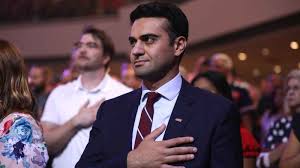The Implications and Objectives of U.S. Congressman Ibrahim Hamada's Visit to Damascus

The main topics of the visit included the file of American citizens and the missing, where Hamada discussed with President al-Shara the return of the body of American activist Kayla Mueller, who was kidnapped by ISIS in 2013.
He called for the establishment of a safe humanitarian corridor to deliver aid to the governorate of Suwayda, which has been experiencing unrest since last July.
Hamada discussed with the Syrian government regarding joining the Abraham Accords, which Israel signed with several Arab countries including the UAE, Bahrain, Morocco, and Sudan.
He also emphasized the need to "correct Syria's course" and build a state that guarantees the rights of all components (Christians, Druze, Kurds, Alawites)
Hamada supported U.S. President Donald Trump's decision to ease some sanctions on Syria to support reconstruction. He confirmed that Congress will monitor the Syrian government's commitment to its pledges to Washington, especially in the areas of human rights and counter-terrorism.
During his meeting with the Syrian Finance Minister, both sides discussed reforming the financial sector and opportunities for future cooperation. The Syrian minister expressed optimism about improving bilateral relations, especially in economic fields.
This visit is significant as it is the first visit by a senior U.S. official directly between Jerusalem and Damascus in decades, indicating a potential shift in U.S. policy.
It shows that Washington is dealing with the new Syrian government as a potential partner, despite not officially recognizing it yet.
The visit comes after rising tensions in Suwayda and Israeli strikes, which may indicate a U.S. desire to calm the situation.
The call for Syria to join the "Abraham Accords" reflects a U.S. effort to expand normalization with Israel.
Washington wants guarantees that Damascus will commit to improving humanitarian conditions, halting cooperation with Iran and armed militias, and respecting the rights of minorities.
As for the challenges and potential scenarios, Israel may object to any U.S.-Syrian rapprochement without security guarantees.
Iran and Russia will monitor the situation, especially if U.S.-Syrian cooperation threatens their influence.
The economic crisis makes Damascus in desperate need of the West, but it does not want to give up its strategic alliances.
Regarding the future of U.S.-Syrian relations, if this visit succeeds, we may see steps towards reopening embassies or increasing humanitarian aid.
However, if it fails, Washington may return to a policy of strict sanctions, especially if reports of violations continue.
Ibrahim Hamada's visit to Damascus is a bold step, but it remains preliminary. Its success depends on how responsive the Syrian government is to Washington's demands and on the pressures within the U.S. Congress.